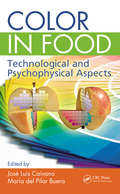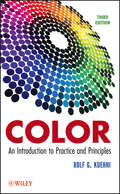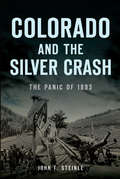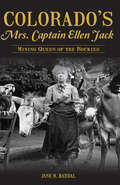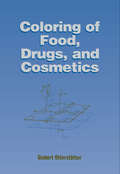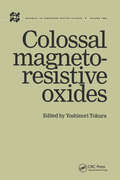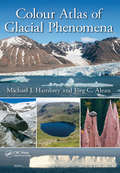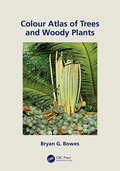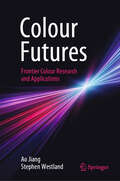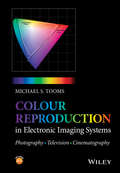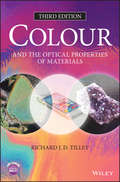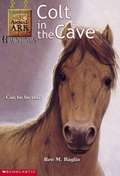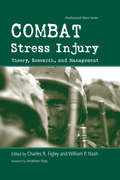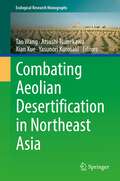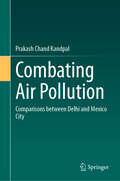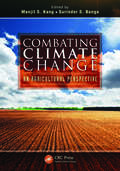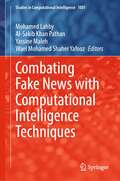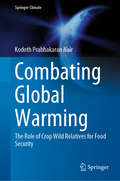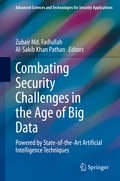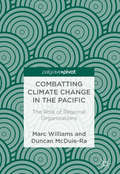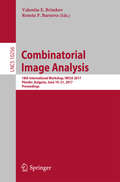- Table View
- List View
Color in Food: Technological and Psychophysical Aspects
by María del Pilar Buera José Luis CaivanoControlling, measuring, and "designing" the color of food are critical concerns in the food industry, as the appeal of food is chiefly determined visually, with color the most salient visual aspect. In 2010 at the International Color Association Interim Meeting held in Mar del Plata, Argentina, a multidisciplinary panel of food experts gathered to
Color: An Introduction to Practice and Principles
by Rolf G. KuehniThe one-stop reference to the essentials of color science and technology--now fully updated and revised The fully updated Third Edition of Color: An Introduction to Practice and Principles continues to provide a truly comprehensive, non-mathematical introduction to color science, complete with historical, philosophical, and art-related topics. Geared to non-specialists and experts alike, Color clearly explains key technical concepts concerning light, human vision, and color perception phenomena. It covers color order systems in depth, examines color reproduction technologies, and reviews the history of color science as well as its relationship to art and color harmony. Revised throughout to reflect the latest developments in the field, the Third Edition: Features many new color illustrations, now fully incorporated into the text Offers new perspectives on what color is all about, diverging from conventional thinking Includes new information on perception phenomena, color order, and technological advances Updates material on such topics as the CIE colorimetric system and optimal object colors Extends coverage of color reproduction to display systems, photography, and color management Contains a unique timetable of color in science and art, plus a glossary of important terms Praise for the previous editions: "A nice bridge to areas usually not covered in academic visual science programs . . . outstanding." --Joel Pokorny, visual scientist at The University of Chicago "A good addition to any library, this should be useful for the color interests of artists, designers, craftsmen, philosophers, psychologists, color technologies, and students in related fields." --CHOICE
Colorado and the Silver Crash: The Panic of 1893 (Disaster)
by John F. SteinleA catastrophic depression engulfed Colorado in 1893. The government's decision to adopt the gold standard and stop buying silver hit the mining industry like a cave-in. Unemployment reached 90 percent in Leadville, a city built on silver. Strikes by union miners in Cripple Creek and Leadville led to destruction and death. Political parties split along battle lines of gold versus silver. By 1898, the country had begun to recover, but silver mining was never the same. Using firsthand commentary and more than one hundred historic photographs, John Steinle skillfully commemorates the story of Coloradans trapped in the unprecedented social, economic and political conflict of America's first great depression.
Colorado's Mrs. Captain Ellen Jack: Mining Queen of the Rockies
by Jane Bardal"You get off this property." - Capt. Ellen Jack, 1887 Ellen E. Jack backed up her orders with a shotgun as she stood at the entrance to her Black Queen Mine. To profit from the mine, located near Aspen, Colorado, she engaged in many other battles with lawyers and capitalists who tried to wrest her ore away. Mrs. Captain Jack contributed to the myth of the West by crowning herself as the "Mining Queen of the Rockies" as she entertained tourists at her roadhouse near Colorado Springs. Author Jane Bardal offers a captivating biography of a pioneering woman who fashioned a legacy through true tenacity and maybe even a few tall tales.
Colored Cereals: Properties, Processing, Health Benefits, and Industrial Uses
by Ram Sarup Singh Sukhvinder Singh PurewalColored cereals are becoming a substance of research interest due to their unique color and health-benefiting properties. Colored grains are being utilized in the preparation of antioxidant-rich food products. Colored Cereals: Properties, Processing, Health Benefits, and Industrial Uses discusses numerous aspects of colored cereals and explores their properties, processing techniques, health benefits, and industrial applications. Furthermore, it serves as a vital resource for researchers, industry professionals, and students working on different aspects of colored cereals.Features: Discusses information related to the biochemistry of colored cereals Highlights comprehensive information on different aspects of colored grains Explores the research and innovations aimed at enhancing the nutritional and agronomic traits Discusses the specific environmental and agricultural requirements Explores crucial techniques and practices for preserving the quality and nutritional value of colored cereals Discusses the extraction, identification, and health benefits of natural pigments Highlights practical ways to incorporate natural pigments into cereal-based products With this book, readers gain insights into the current market trends, research directions, and future potential of colored cereals, inspiring further development in this field. Renowned experts in agriculture, food science, and nutrition have curated this comprehensive volume. Their collective expertise ensures a thorough and insightful exploration of colored cereals, making this book an indispensable reference for anyone interested in this dynamic area of study.
Coloring of Food, Drugs, and Cosmetics (Food Science and Technology)
by Gisbert Otterstätter"Provides a wide range of information on the composition, utilization, and evaluation of colorants and pigments in food, pharmaceuticals, and cosmetic products. Tabulates key data for food, drug, and cosmetic colorants by Color Index Numbers. Thoroughly describes the relationships between coloring reactions."
Colossal Magnetoresistive Oxides (Advances in Condensed Matter Science)
by Yoshinori TokuraThe features and mechanism of Colossal Magnetoresistance, or CMR, in manganese oxides as well as device physics are highlighted in this book, with a focus on tunneling MR for some artificial structures. Underlying new science, such as tunable electron-lattice interaction in a metal and roles of orbital degrees of freedom in producing an unconventio
Colour Atlas of Glacial Phenomena
by Michael J. Hambrey Jürg C. AleanConsidering that glaciers and ice sheets cover about 10% of the Earth’s land surface in a world where human civilization is increasingly impacted by the effects of changing glacial activity, Colour Atlas of Glacial Phenomena presents itself as an indispensable guide for students, professionals, and researchers who want to be better informed while studying and tracking the future influences of glaciers and ice sheets on the global environment. While stressing both the beauty and utility of glaciers, the authors cover critical features of glaciers and their landforms and provide useful explanations of the key concepts in glaciology and glacial geology. The authors expand to demonstrate how our lives are influenced by the Cryosphere, a key component of the Earth system and how this heightens the vulnerability of glaciers and ice sheets to deterioration. This illustrated book also helpfully maps out regions of mountain glaciers and ice caps around the world for a practical reference and discusses the products of glacial erosion and deposition integral to understanding rising global sea levels.
Colour Atlas of Woody Plants and Trees
by Bryan G. BowesTrees and plants are important components of the human environment having significant presence beyond agricultural and recreational values. Colour Atlas of Woody Plants and Trees presents a photographic compilation of morphological features of trees and shrubs giving attention to their unique aspects not presented in existing books. By increasing awareness to users through high quality, full-color photographs and informative text, this book demonstrates the enormous diversity of vascular trees and plants living today. Features: Full color atlas offers concise, but highly informative text accompanied by over 200 high-resolution digital tree images Contains images of the anatomy of tree structures and evolution of the most important features of trees Presents information on the varied structure and morphology exhibited by trees and demonstrates their vital importance in the current struggle for the survival of our human society Surveys the most important morphological features of plants, shrubs and trees Presents aspects of plants and trees both common and rarely seen in nature Bryan Geoffrey Bowes is a retired Senior Lecturer in the Botany Department at Glasgow University and was a Research Fellow in ETH Zurich, Harvard University, and University of New England, Australia. His research interests encompass plant anatomy and ultrastructure, plant regeneration, and morphogenesis in vitro.
Colour Futures: Frontier Colour Research and Applications (Vision, Illusion and Perception #5)
by Stephen Westland Ao JiangThis book delves into the nuanced interplay of colour in human perception and its applications across diverse fields, highlighting the transformative impact on art, design, digital media, and technology. The book introduces an innovative approach by integrating scientific research with practical applications, making it a pivotal resource for designers, psychologists, and technologists. Its scope ranges from foundational aspects of colour vision to futuristic applications in virtual reality and artificial intelligence, offering fresh insights and forecasting emerging trends. This comprehensive exploration is essential for anyone interested in the strategic use of colour to enhance user experience and cultural expressions.
Colour Reproduction in Electronic Imaging Systems
by Michael S. ToomsMichael S. Tooms Principal Consultant, MTA, UK With the move of cinema away from film, the adoption of electronic-based production throughout all media is now complete. In order to exploit its advantages, the accurate definition, measurement and reproduction of colour has become more important than ever to achieve the best fidelity of colour reproduction. This book is concerned with providing readers all they need to know about colour: how it is perceived and described, how it is measured and generated and how it is reproduced in colour systems. It serves as both a tutorial and a reference book, defining what we mean by colour and providing an explanation of the proper derivation of chromaticity charts through to the means of ensuring accurate colour management. Key Features: Addresses important theory and common misconceptions in colour science and reproduction, from the perception and characteristics of colour to the practicalities of its rendering in the fields of television, photography and cinematography Offers a clear treatment of the CIE chromaticity charts and their related calculations, supporting discussion on system primaries, their colour gamuts and the derivation of their contingent red, green and blue camera spectral sensitivities Reviews the next state-of-the-art developments in colour reproduction beyond current solutions, from Ultra-High Definition Television for the 2020s to laser projectors with unprecedented colour range for the digital cinema Provides the reader with a large collection of invaluable macro-enabled data worksheets related to each chapter in the book, containing a range of manipulable colorimetric data
Colour and the Optical Properties of Materials: An Exploration Of The Relationship Between Light, The Optical Properties Of Materials And Colour
by Richard J. TilleyThe updated third edition of the only textbook on colour The revised third edition of Colour and the Optical Properties of Materials focuses on the ways that colour is produced, both in the natural world and in a wide range of applications. The expert author offers an introduction to the science underlying colour and optics and explores many of the most recent applications. The text is divided into three main sections: behaviour of light in homogeneous media, which can largely be explained by classical wave optics; the way in which light interacts with atoms or molecules, which must be explained mainly in terms of photons; and the interaction of light with insulators, semiconductors and metals, in which the band structure notions are of primary concern. The updated third edition retains the proven concepts outlined in the previous editions and contains information on the significant developments in the field with many figures redrawn and new material added. The text contains new or extended sections on photonic crystals, holograms, flat lenses, super-resolution optical microscopy and modern display technologies. This important book: Offers and introduction to the science that underlies the everyday concept of colour Reviews the cross disciplinary subjects of physics, chemistry, biology and materials science, to link light, colour and perception Includes information on many modern applications, such as the numerous different colour displays now available, optical amplifiers lasers, super-resolution optical microscopy and lighting including LEDs and OLEDs Contains new sections on photonic crystals, holograms, flat lenses, super-resolution optical microscopy and display technologies Presents many worked examples, with problems and exercises at the end of each chapter Written for students in materials science, physics, chemistry and the biological sciences, the third edition of Colour and The Optical Properties of Materials covers the basic science of the topic and has been thoroughly updated to include recent advances in the field.
Colt in the Cave (Animal Ark Hauntings #4)
by Ben M. BaglioMandy and her best friend James are used to dealing with animals in distress. But ghostly animals in distress are a different matter... Mandy and James are excited about their school trip to an old mine. Deep underground, Mandy begins to imagine how difficult life must have been for the ponies that used to work down there. Suddenly, she spots eyes gleaming in the darkness, watching her. But James can't see a thing! The very next night, Mandy dreams about a troubled pony. What can it all mean -- is there a horse that needs her help?
Combat Stress Injury: Theory, Research, and Management (Psychosocial Stress Series)
by William P. Nash Charles R. FigleyCombat Stress Injury represents a definitive collection of the most current theory, research, and practice in the area of combat and operational stress management, edited by two experts in the field. In this book, Charles Figley and Bill Nash have assembled a wide-ranging group of authors (military / nonmilitary, American / international, combat veterans / trainers, and as diverse as psychiatrists / psychologists / social workers / nurses / clergy / physiologists / military scientists). The chapters in this volume collectively demonstrate that combat stress can effectively be managed through prevention and training prior to combat, stress reduction methods during operations, and desensitization programs immediately following combat exposure.
Combat-Ready Kitchen
by Anastacia Marx de SalcedoAmericans eat more processed foods than anyone else in the world. We also spend more on military research. These two seemingly unrelated facts are inextricably linked. If you ever wondered how ready-to-eat foods infiltrated your kitchen, you'll love this entertaining romp through the secret military history of practically everything you buy at the supermarket.In a nondescript Boston suburb, in a handful of low buildings buffered by trees and a lake, a group of men and women spend their days researching, testing, tasting, and producing the foods that form the bedrock of the American diet. If you stumbled into the facility, you might think the technicians dressed in lab coats and the shiny kitchen equipment belonged to one of the giant food conglomerates responsible for your favorite brand of frozen pizza or microwavable breakfast burritos. So you'd be surprised to learn that you've just entered the U.S. Army Natick Soldier Systems Center, ground zero for the processed food industry.Ever since Napoleon, armies have sought better ways to preserve, store, and transport food for battle. As part of this quest, although most people don't realize it, the U.S. military spearheaded the invention of energy bars, restructured meat, extended-life bread, instant coffee, and much more. But there's been an insidious mission creep: because the military enlisted industry--huge corporations such as ADM, ConAgra, General Mills, Hershey, Hormel, Mars, Nabisco, Reynolds, Smithfield, Swift, Tyson, and Unilever--to help develop and manufacture food for soldiers on the front line, over the years combat rations, or the key technologies used in engineering them, have ended up dominating grocery store shelves and refrigerator cases. TV dinners, the cheese powder in snack foods, cling wrap . . . The list is almost endless.Now food writer Anastacia Marx de Salcedo scrutinizes the world of processed food and its long relationship with the military--unveiling the twists, turns, successes, failures, and products that have found their way from the armed forces' and contractors' laboratories into our kitchens. In developing these rations, the army was looking for some of the very same qualities as we do in our hectic, fast-paced twenty-first-century lives: portability, ease of preparation, extended shelf life at room temperature, affordability, and appeal to even the least adventurous eaters. In other words, the military has us chowing down like special ops.What is the effect of such a diet, eaten--as it is by soldiers and most consumers--day in and day out, year after year? We don't really know. We're the guinea pigs in a giant public health experiment, one in which science and technology, at the beck and call of the military, have taken over our kitchens.From the Hardcover edition.
Combating Aeolian Desertification in Northeast Asia (Ecological Research Monographs)
by Tao Wang Atsushi Tsunekawa Xian Xue Yasunori KurosakiThis book presents the definition of aeolian desertification and uncovers its processes, driving factors, and consequences, and focuses on measures to effectively combat aeolian desertification in Northeast Asia. Aeolian desertification in Northeast Asia is of great concern for its destructive influences on the environment and society not only in the local but also in faraway areas. The topics of this book are addressed by compiling theoretical review, remote sensing monitoring, synoptic analysis, and laboratory and field studies in China, Japan, and Mongolia. This is the first comprehensive book to address the aeolian desertification in Northeast Asia. Readers can learn the basic theory of aeolian desertification and the primary causes of this environmental problem. More critical is the successful practical countermeasures to combat desertification which can be referred to by various stakeholders who concern the aeolian desertification in Northeast Asia. To meet the Sustainable Development Goals of the United Nations adopted in 2015, especially its Goal 15.3 to achieve a land degradation-neutral world by 2030, desertification combating actions should be taken cross country borders. This book is not only intended for environmental professionals but also for people who are affected and concerned about desertification and land degradation. The concept and processes in this book will serve as a ready reference to understand the aeolian desertification with countermeasures and successful preventing stories that can be referred to.
Combating Air Pollution: Comparisons between Delhi and Mexico City
by Prakash Chand KandpalThe primary objective of this book is to probe into the menace of air pollution in Delhi, which has emerged as the main threat to public health and the environment in the capital city. The book explores the viable solutions to the problem, examines the existing policies and programmes developed by the Government and the policy makers to address the issue, traverse the hurdles in the implementation of these policies and reveals the politics over air pollution in Delhi. It also discusses about the other highly polluted cities of the world, specifically Mexico City, which has faced environmental emergencies due to air pollution in the past, and how these cities have prepared themselves to combat the menace of air pollution, and what can be learnt from their experiences to face the same situations in Delhi. The book examines how air pollution is being addressed in the context of environmental policy frameworks and politics, and will be of use to policy makers, researchers, governmental and non-governmental agencies working to combat air pollution in major cities.
Combating Climate Change: An Agricultural Perspective
by Manjit S. Kang Surinder S. BangaThe effects of climate change can already be felt around the world, and they will likely impact all facets of human civilization-from health, livelihood security, agricultural production, and shelter to international trade. Since anthropogenic factors are mainly to blame for the current trends in global warming, human intervention will be necessary
Combating Desertification in Asia, Africa and the Middle East: Proven practices
by Victor R. Squires G. Ali HeshmatiThis book is about the 'how' of desertification control as opposed to an analysis of the 'why' and fills a gap in the desertification-related literature in that it shows what to do in situations ranging from fixing mobile sands to arresting accelerated soil erosion in sloping lands. There are numerous illustrations to show the successful techniques. This compilation demonstrates that desertification and land degradation can be controlled and reversed with existing techniques in such widely varying environments as the Sahel of Africa to Sri Lanka and the Philippines in SE Asia, from mountains in Lesotho to low lands on desert margins in Mongolia. Proven approaches include technical interventions, changes in governance and to the legislative framework and policy reform. The book fills a gap in the desertification-related literature in that it shows what to do in situations ranging from fixing mobile sands to arresting accelerated soil erosion in sloping lands.
Combating Fake News with Computational Intelligence Techniques (Studies in Computational Intelligence #1001)
by Al-Sakib Khan Pathan Yassine Maleh Mohamed Lahby Wael Mohamed Shaher YafoozThis book presents the latest cutting-edge research, theoretical methods, and novel applications in the field of computational intelligence techniques and methods for combating fake news. Fake news is everywhere. Despite the efforts of major social network players such as Facebook and Twitter to fight disinformation, miracle cures and conspiracy theories continue to rain down on the net. Artificial intelligence can be a bulwark against the diversity of fake news on the Internet and social networks. This book discusses new models, practical solutions, and technological advances related to detecting and analyzing fake news based on computational intelligence models and techniques, to help decision-makers, managers, professionals, and researchers design new paradigms considering the unique opportunities associated with computational intelligence techniques. Further, the book helps readers understand computational intelligence techniques combating fake news in a systematic and straightforward way.
Combating Global Warming: The Role of Crop Wild Relatives for Food Security (Springer Climate)
by Kodoth Prabhakaran NairThis book critically examines the environmental hazards posed by global warming with regard to future food security, which will depend on a combination of stresses, both biotic and abiotic, imposed by climate change; variability of weather within a growing season; and the development of cultivars that are more sensitive to different ambient conditions. Furthermore, the ability to develop effective adaptive strategies which allow these cultivars to express their genetic potential under changing climate conditions will be essential. In turn, the book investigates those plant species which are very closely related to field crops and have the potential to contribute beneficial traits for crop improvement, e.g. resistance to a wide range of biotic and abiotic stresses, enriching the gene pool, and ultimately leading to enhanced plant yield, known as “Crop Wild Relatives” (CWRs). CWRs hold tremendous potential to sustain and enhance global food security, contributing to human well-being. Accordingly, their development, characterization and conservation in crop breeding programs have assumed great practical importance.Professor Kodoth Prabhakaran Nair is an internationally acclaimed agricultural scientist, with over three decades of experience in Europe, Africa and Asia, holding some of the most prestigious academic positions, including the National Chair of the Science Foundation, The Royal Society, Belgium. A Senior Fellow of the world renowned Alexander von Humboldt Research Foundation of The Federal Republic of Germany, he is best known, globally, for having developed a revolutionary soil management technique, known as "The Nutrient Buffer Power Concept", which, while questioning the scientific fallacies of the highly soil extractive farming, euphemistically known as the "green revolution", has opened up an alternative path for sensible and scientific soil management
Combating Plastic Pollution in Terrestrial Environment: Challenges and Strategies for a Sustainable Future
by Kandiah Pakeerathan S. Suriyanarayanan Shivaraju H. P.This book explores the challenges posed by plastic pollution in terrestrial environment and focuses on the reuse of plastic waste for sustainable practices, as well as the challenges and innovative approaches to combat the growing plastic crisis. This book is intended for a diverse audience including researchers, policymakers, environmental professionals, educators, technocrats, and researchers/students interested in advancing knowledge and action on plastic pollution in terrestrial environment. 27 chapters included in the book are contributed by scientists, researchers and policymakers from 12 countries, namely Bangladesh, Egypt, India, Iraq, Malaysia, Mauritius, Mexico, Myanmar, Nepal, Pakistan, Sri Lanka, and Taiwan.
Combating Security Challenges in the Age of Big Data: Powered by State-of-the-Art Artificial Intelligence Techniques (Advanced Sciences and Technologies for Security Applications)
by Zubair Md. Fadlullah Al-Sakib Khan PathanThis book addresses the key security challenges in the big data centric computing and network systems, and discusses how to tackle them using a mix of conventional and state-of-the-art techniques. The incentive for joining big data and advanced analytics is no longer in doubt for businesses and ordinary users alike. Technology giants like Google, Microsoft, Amazon, Facebook, Apple, and companies like Uber, Airbnb, NVIDIA, Expedia, and so forth are continuing to explore new ways to collect and analyze big data to provide their customers with interactive services and new experiences. With any discussion of big data, security is not, however, far behind. Large scale data breaches and privacy leaks at governmental and financial institutions, social platforms, power grids, and so forth, are on the rise that cost billions of dollars. The book explains how the security needs and implementations are inherently different at different stages of the big data centric system, namely at the point of big data sensing and collection, delivery over existing networks, and analytics at the data centers. Thus, the book sheds light on how conventional security provisioning techniques like authentication and encryption need to scale well with all the stages of the big data centric system to effectively combat security threats and vulnerabilities. The book also uncovers the state-of-the-art technologies like deep learning and blockchain which can dramatically change the security landscape in the big data era.
Combatting Climate Change in the Pacific: The Role of Regional Organizations
by Marc Williams Duncan McDuie-RaThis book analyses the regional complexes of climate security in the Pacific. Pacific Island States and Territories (PICTs) have long been cast as the frontline of climate change and placed within the grand architecture of global climate governance. The region provides compelling new insights into the ways climate change is constructed, governed, and shaped by (and in turn shapes), regional and global climate politics. By focusing on climate security as it is constructed in the Pacific and how this concept mobilises resources and shapes the implementation of climate finance, the book provides an up-to-date account of the way regional organizations in the Pacific have contributed to the search for solutions to the problem of climate insecurity. In the context of the United Nations Climate Change Conference (COP21) in Paris in 2015, the focus of this book on regional governance offers a concise and innovative account of climate politics in the prevailing global context and one with implications for the study of climate security in other regions, particularly in the developing world.
Combinatorial Image Analysis: 18th International Workshop, IWCIA 2017, Plovdiv, Bulgaria, June 19-21, 2017, Proceedings (Lecture Notes in Computer Science #10256)
by Reneta P. Barneva Valentin E. BrimkovIt is indeed a great pleasure to welcome you to the proceedings of the 12th International Workshop on Combinatorial Image Analysis (IWCIA 2008) held in Bu?alo, NY, April 7-9, 2008. Image analysis is a scienti?c discipline providing theoretical foundations and methods for solving problems that appear in various areas of human practice, as diverseas medicine, robotics, defense, andsecurity. As a rule, the processeddata are discrete; thus, the "discrete," or "combinatorial"approachto image analysis appears to be a natural one and therefore its importance is increasing. In fact, combinatorial image analysis often provides various advantages (in terms of - ciency and accuracy) over the more traditional approaches based on continuous models requiring numeric computation. The IWCIA workshop series provides a forum for researchers throughout the world to present cutting-edge results in combinatorial image analysis, to discuss recent advances in this research ?eld, and to promote interaction with researchersfromothercountries. Infact, IWCIA2008retainedandevenenriched the international spirit of these workshops, that had successful prior meetings in Paris (France) 1991, Ube (Japan) 1992, Washington DC (USA) 1994, Lyon (France) 1995, Hiroshima (Japan) 1997, Madras (India) 1999, Caen (France) 2000, Philadelphia (USA) 2001, Palermo (Italy) 2003, Auckland (New Zealand) 2004, and Berlin (Germany) 2006. The IWCIA 2008 Program Committee was highly international as its members are renowned experts coming from 23 di?- entcountries, andsubmissionscamefrom24countriesfromAfrica, Asia, Europe, North and South America.
